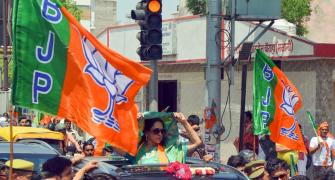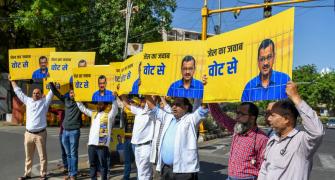Unscientific treatment methods, including administration of electric shocks or chemicals such as potassium permanganate, are largely responsible for India having the highest incidence of snakebite deaths in the world, experts said.
"India is neither home to the largest number of venomous snakes in the world, nor is there a shortage of anti-venom in the country. Yet, every year 50,000 Indians, mostly poor villagers, die in 250,000 incidents of snakebite," said Ian Simpson of the World Health Organisation Treatment Group for Snakebite.
Simpson said, "Snakebite is very easy to treat, provided we start the treatment without losing too much time."
According to V V Pillay of the Poison Control Centre at the Amritha Institute of Medical Sciences in Kochi, Kerala, the main cause of this 'unacceptable incidence' of snakebite fatalities is that instead of going to the nearest hospital, people try out all kinds of 'bizarre remedies' at first.
Dr Pillay said, "People, especially in the rural areas, tend to go to the traditional healers first. We have come across strange practices, including use of chickens and hens to suck out the venom. These do not work and just result in precious time being lost."
However, at times even qualified doctors also do not know how to deal with snakebite cases. "There is lot of confusion about symptoms. Often, anti-venom is needlessly administered even when there is no need for it, which can result in more trauma as the antidote can result in severe side-effects," he added.
Concerned about this situation, WHO, in collaboration with leading Indian experts, is in the process of formulating a 'National Protocol' for management of snakebites in India.
Describing this as the first initiative of its kind in the world, Dr Pillay said the protocol would prescribe uniform and standardised methods of dealing with snakebite cases, applicable to the Indian situation.
"Often in India it is not possible for a villager to get to a hospital within ten minutes, which is necessary when methods such as pressure immobilisation are used. It is thus necessary that we come out with an Indian protocol, suited to the Indian situation," Simpson added.
In a culmination of nearly two years of field work and research, WHO and the Poison Control Centre at AIMS, would hold a two-day 'National Snakebite Conference' in Kochi from Monday to finalise the Indian Protocol. The conference would be be attended by 40 experts and 30 delegates drawn from the fields of clinical medicine, forensic medicine, toxicology and pharmacology.
"We hope to have the draft National Protocol ready by the end of the conference, after which it will be submitted to the Union Health and Family Welfare Ministry for ratification," Dr Pillay said.








